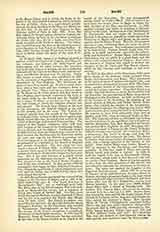

Roman cardinal and celebrated philologist, b. at Schilpario, in the Diocese of Bergamo, March 7, 1782; d. at Albano, September 9, 1854. At an early age he entered the Society of Jesus (he was a novice in 1779), was sent to the residence in Naples (1804) and was also stationed at Orvieto and Rome. However, on account of his proficiency in paleography he was appointed in 1811 to a position in the Ambrosian Library, Milan. This led to his initial discoveries: Cicero’s orations: “Pro Scauro”, “Pro Tullio”, “Pro Flacco”, “In Clodium”, and “In Curionem” (1814); the correspondence of Fronto, Marcus Aurelius, and Verus (1815); the speech of Isaeus, “De haereditate Cleonymi” (1815); a fragment of the “Vidularia” of Plautus, and commentaries on Terence (1816); Philo, “De Virtute”; a discourse of Themistius; a fragment of Dionysius of Halicarnassus (1816); a Gothic version of St. Paul; the “Itinerarium Alexandri”; a biography of Alexander by Julius Valerius (1817); and an Armenian version of the “Chronicle” of Eusebius (1818). So many new texts, almost all of which were found in palimpsests, not to mention some editions of already known texts, drew world-wide attention to Mai. In 1819, his superiors decided that he could render greater service in the ranks of the secular clergy; he therefore left the Society and was called by the pope to the Vatican Library. He then worked with increased zest in a richer field. His most brilliant find at this time was the “Republic” of Cicero (1822). To insure the regular publication of his discoveries, he began large series of Anecdota: “Scriptorum veterum nova collectio” (10 vols., 1825-38); “Classici auctores” (10 vols., 1825-38); “Spicilegium Romanum” (10 vols., 1839-44); “Nova Patrum bibliotheca” (7 vols., 1852-54), published by Mai himself. The profane authors who profited by Mai’s labors are: Diodorus of Sicily; Polybius; Oribasus; Procopius; Cicero (especially the Verrine orations), and the Roman jurisconsults. Important discoveries were made likewise with regard to the works of the Fathers: Saints Augustine, Hilary, Cyprian, Jerome, Ambrose, Athanasius, Cyril, Basil, and Origen, Trenaeus, Eusebius of Caesarea, etc. To these ancient writers must be added the Italian Humanists, the Latin poets of the fourteenth and fifteenth centuries, Pollziano, Sannazaro, Bembo, Sadoleto, and others, whose works he printed for the first time in the “Spicilegium Romanum”. He gave to the world unpublished pages of more than 350 authors. Finally, he did not overlook the Bible. After long delays, inspired by timidity, he was as last authorized to make known one of the most important Greek MS. of the Bible (Vetus et Novum Testamentum ex antiquissimo codice Vaticano, 1858). It has been stated that the gall nut used by Mai to revive the writing of the palimpsests half destroyed them. The truth is that all reagents injure parchment. Soon little will remain of the palimpsest of Plautus in the Ambrosian Library. But the work of Studemund, Mai’s successor, will insure its perpetuity. Mai’s brilliant discoveries won him the homage and affection of many. He was an intimate friend of Leopardi, the poet of New Italy, a friendship equally honorable to both. Mai was blamed for his great unwillingness to allow the learned to share in the treasures he guarded so jealously. He wished to enjoy them all alone. In 1838, the pope named him cardinal; but he continued his researches, and his publications were interrupted only by his death.
PAUL LEJAY

